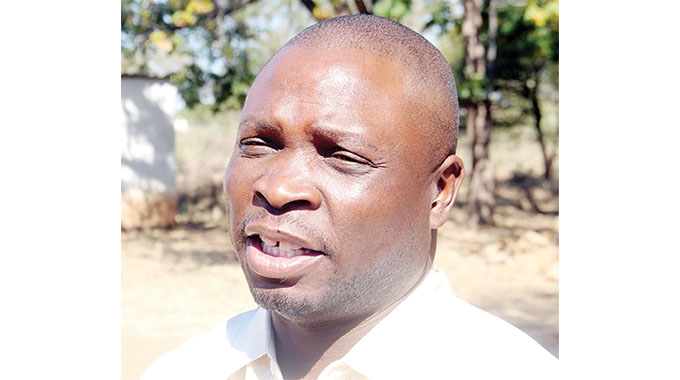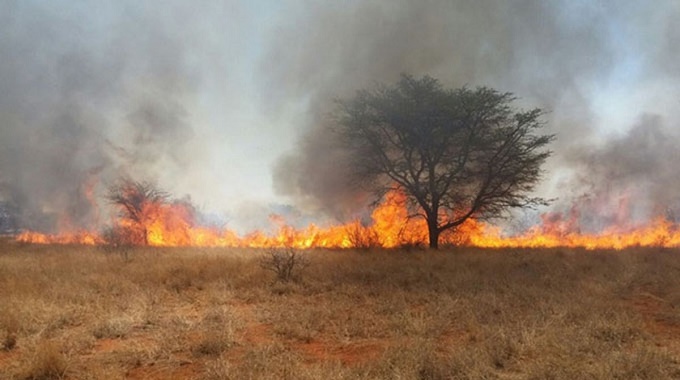
The Sunday News

Fairness Moyana in Hwange
COMMUNITIES in Matabeleland North Province have been implored to scale up efforts to curb veld fires after it emerged that 172 900 hectares of land were destroyed by infernos this year, a 132 percent increase from the previous year figure of 74 1184ha.
The province occupies the second slot after Mashonaland West in the total hectares destroyed by fire. According to the 2022 Fire Report compiled by the Environmental Management Agency (EMA), Hwange District is among the top fire hotspots in the province with 88 307 hectares having been lost.
In a speech read on his behalf by Lupane District Development Co-ordinator, Ms Ennety Sithole during the provincial launch of the National Fire Week at Sikabela Village in Matetsi last week, Minister of State for Matabeleland North Provincial Affairs and Devolution Cde Richard Moyo said there was a need for the province to scale up on various initiatives to address the problem.

Bee smoking
“This year we are commemorating the day under the theme ‘Veld fires, a food security threat-protect the harvest’. The theme focuses and puts emphasis on the nexus between veld fire management and sustainable food systems. This in turn improves food security and supports the achievement of global and national objectives without leaving anyone and any place behind.
Furthermore this calls for collaborative effort by all of us in ensuring that the environment, life, property and the harvest is saved and protected from veld fires. Each year, the province loses huge hectarage of forests and grasslands to veld fires, depriving wildlife and livestock of pastures. As a province we need to scale up on various initiatives to address this scourge,” said Cde Moyo.
He bemoaned the rapid increase in land lost to veld fires that has seen the province maintaining a four-year streak at second place nationally. Suspected wildlife poaching and bee smoking activities in the parks area and State forests, land preparation activities, fires left unattended at bus stops and illegal charcoal mining were fingered as being among the causes.
Cde Moyo said as part of addressing the challenge, various initiatives such as thatch grass combing, hay baling, bee keeping and fire guard construction could be employed by communities to protect the land from veld fires.

Cde Richard Moyo
“Allow me to urge our communities to partner Agritex, EMA and Forestry Commission in hay baling projects. Matabeleland North is hailed for livestock and wildlife production hence the need to protect the veld.”

Fire fighting equipment
Traditional leaders were also urged to exercise their authority vested in them to protect natural resources. Cde Moyo saluted the Matetsi Environment Sub-Committee who set aside revenue accrued from their hunting quotas to budget for veld fire management, a move that has seen them embark on construction of fireguards and acquisition of fire fighting equipment.
Meanwhile, EMA has been on a whirlwind training of communities in bee keeping as an economic value with the Kasibo community which was trained in 2021 realising their first harvest of honey while Mindora in Umguza received equipment following a two-day training exercise. The equipment included 50 bee hives, 15 bee suits, 15 brushes, 15 bee tools, 15 smokers, 15 pairs of gloves and 40 sickles for biomass reduction projects initiated by women.

Mrs Chipo Mpofu-Zuze
EMA Matabeleland North provincial manager Mrs Chipo Mpofu-Zuze said the agency was working with communities in harnessing natural resources with a fire risk modelling tool having been produced to help in preparing for the fire season.

“As EMA we have produced a fire risk modelling tool that will help us in determining the causes to assist in prediction and level of preparedness for the fire season. For this season we didn’t get much rain here in our province so we are on high risk meaning even the biomass isn’t much. This year we have said each province must identify a community where we are going to model a fire management from re-suppression measures, projects and fire management skills through the season,” she said.



